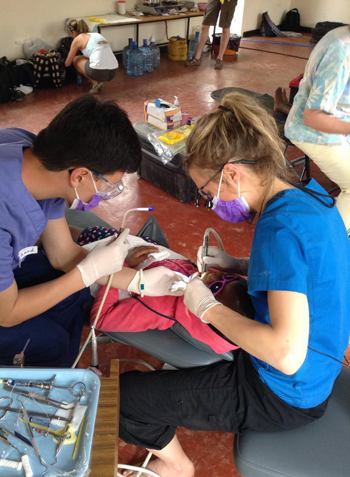
Students from the School of Dentistry were in a Maasai village in Kenya as part of A Better World.
Sam is a 14-year-old boy from a Maasai village in Kenya. Despite already having his tooth extracted, he always found his way back in to the A Better World volunteer dental clinic. During one particular visit, third year dental student Leanne Grinde asked him if he had become a Maasai warrior yet - protector of his community. His response surprised her.
Sam said no. And that he wanted to be a dentist. So Grinde did the only thing she could, she let him stay and observe the volunteers. Besides, he proved to be a great translator for them too.
Sam's story is just one of the many experiences dentistry students come back home with. Each year more than 15 students take part in missions around the world with non-profit organizations like A Better World, Kindness in Action and Dentistry for All.
"Even though you might just be pulling a tooth, they are so happy and thankful," says Grinde. "It was nice to see dentistry in the realm of healthcare."
Grinde, along with dental students Mika Wierenga and Stephanie McCorkill, were in Kenya, Africa, from February 7 to 22. Clinics were set-up in three remote regions and close to 200 locals received charitable dental care.
"A lot of them had walked for hours to come see us," says Wierenga. "What's amazing is that as dental students we were able to share the importance of oral health internationally. Going to a different country changes you. You could definitely see that a smile is universal."
The personal growth each student experienced is priceless. Understanding the cultural beliefs around oral care in the Maasai people was invaluable. Many of these people have their lower central incisors taken out as children, and they believe canines are bad luck. Most of these procedures are done without local anesthetic and with just a knife and rock she explained.
Patients with infections, decayed teeth, and abscess were commonly treated, and preventative oral hygiene was taught using their tools - an Acacia tree branch for brushing teeth.
"Seeing some of the patients was shocking," says McCorkill. "Some of the kids' faces were swollen shut because of abscess. We don't see kids like that here. Having little experience with this, it helped increase our skills."